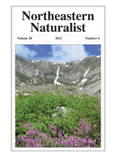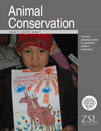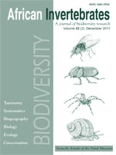
NORTHEASTERN NATURALIST
metrics 2024
Unveiling the Secrets of Northeastern Ecosystems
Introduction
NORTHEASTERN NATURALIST is a prominent academic journal published by the Eagle Hill Institute, focusing on the intricate field of ecology, evolution, behavior, and systematics. With an ISSN of 1092-6194 and an E-ISSN of 1938-5307, this journal serves as a vital platform for researchers, professionals, and students who are keen on contributing to or expanding their knowledge of natural history in the Northeastern United States. Although currently not designated as Open Access, it maintains a significant academic influence, evidenced by its ranking as Q4 in the 2023 Ecology, Evolution, Behavior and Systematics category, and a Scopus rank of #586 out of 721 within its field, placing it in the 18th percentile. Spanning from 1999 to 2024, the journal aims to disseminate high-quality research that not only enhances scientific understanding but also promotes the conservation and sustainable use of biodiversity. Researchers are encouraged to submit their original studies, reviews, and methodologies that highlight ecological interactions and evolutionary processes, making NORTHEASTERN NATURALIST an essential resource for those dedicated to the science of life.
Metrics 2024
 0.23
0.23 0.50
0.50 0.60
0.60 37
37Metrics History
Rank 2024
Scopus
IF (Web Of Science)
JCI (Web Of Science)
Quartile History
Similar Journals

Neotropical Biodiversity
Advancing knowledge for a thriving Neotropical future.Neotropical Biodiversity is a prominent journal dedicated to advancing our understanding of biodiversity and ecological dynamics within the Neotropical region. Published by TAYLOR & FRANCIS LTD in the United Kingdom, this Open Access journal has been providing unrestricted access to research findings since 2015, fostering collaboration and knowledge sharing among the global scientific community. With an emphasis on innovative research in Ecology, Ecology, Evolution, Behavior and Systematics, and Global and Planetary Change, it has earned a reputation for excellence, currently holding a Q3 category in its field. As of 2023, the journal ranks in the 37th percentile for Environmental Science (Ecology) and in the 36th percentile for Agricultural and Biological Sciences (Ecology, Evolution, Behavior and Systematics), making it a valuable resource for researchers, professionals, and students interested in understanding and preserving biodiversity in one of the world's most diverse ecosystems. We invite you to explore the cutting-edge research published in Neotropical Biodiversity and contribute to the ongoing dialogue for environmental sustainability and ecological resilience.

PROCEEDINGS OF THE LINNEAN SOCIETY OF NEW SOUTH WALES
Illuminating the Path of Ecological Knowledge and DiscoveryPROCEEDINGS OF THE LINNEAN SOCIETY OF NEW SOUTH WALES, ISSN 0370-047X, is a prestigious journal published by the Linnean Society of New South Wales, dedicated to the advancement of knowledge in the fields of natural history, ecology, and biodiversity. Established in the mid-20th century, this journal serves as a vital platform for reporting original research, reviews, and discussions on various aspects of Australian flora and fauna, along with broader contributions to environmental science. Though the journal is not open access, it remains an important resource for researchers, students, and professionals seeking to engage with high-quality studies that inform conservation efforts and ecological understanding in the region. The journal's historical significance is underscored by its coverage of pivotal research from 1980 to 2015, fostering ongoing dialogue within the scientific community and promoting the values of the Linnean Society's commitment to natural history scholarship.

ANIMAL CONSERVATION
Preserving Nature's Legacy, One Study at a Time.Animal Conservation is a prestigious journal that serves as a vital platform for the dissemination of research dedicated to the preservation of wildlife and habitats. Published by Wiley, this journal has established a significant presence in the fields of Ecology and Nature and Landscape Conservation, holding a distinguished Q1 category ranking for both in 2023. With an impressive Scopus rank of #25 in the realm of environmental science, it caters to a global audience keen on understanding and addressing pressing conservation issues. The journal provides researchers, professionals, and students with high-quality, peer-reviewed articles that explore innovative methods and strategies in animal conservation. With its continuous publication since 1998, encompassing a comprehensive range of topics, Animal Conservation is indispensable for anyone aiming to make impactful contributions to the field of ecology and conservation biology.

North-Western Journal of Zoology
Innovative Discoveries in North-Western ZoologyNorth-Western Journal of Zoology is a prominent scholarly publication dedicated to the field of zoology, fostering a vibrant exchange of research findings and insights among scientists, professionals, and students. Published by UNIV ORADEA PUBL HOUSE in Romania, this journal has been a reliable source for advancing knowledge in Animal Science and Zoology since its inception in 2008, with its publications spanning until 2024. With an engaging focus on innovative research and review articles, the journal proudly holds a Q3 quartile ranking in its category for 2023, positioning itself within the competitive landscape of Scopus Ranks. Although currently lacking an open-access model, the journal provides a valuable platform for disseminating critical findings essential to understanding animal biology and ecology. Researchers contributing to this journal benefit from a dedicated readership, furthering the discussion and practical applications of their work in diverse contexts.

CALIFORNIA FISH AND GAME
Pioneering Research in Animal and Aquatic SciencesCalifornia Fish and Game is a prominent journal dedicated to the fields of Animal Science and Aquatic Science, published by the California Fish and Game Editor. With its roots extending back to 1979, the journal has served as a vital platform for disseminating research focused on the wildlife and aquatic ecosystems of California and beyond. Recognized within the Q4 quartile for both Animal Science and Zoology and Aquatic Science, it provides critical insights and scholarly contributions, despite its comparative rankings within the respective categories. The journal, with an ISSN of 0008-1078 and an E-ISSN of 2331-0405, offers an invaluable resource for researchers, professionals, and students alike, looking to deepen their understanding of California's rich biodiversity and ecological challenges. For those interested in open access options, further details can be reviewed through the journal's platform. By fostering a community of inquiry, California Fish and Game plays an essential role in advancing knowledge and conservation efforts in the fields of interest.

AFRICAN INVERTEBRATES
Unveiling the Secrets of African InvertebratesAFRICAN INVERTEBRATES is a distinguished open-access academic journal published by the COUNCIL NATAL MUSEUM, specializing in the study of invertebrate biology within the vibrant ecosystems of Africa. Operating since 2006, this journal has established itself as a vital resource in the fields of Animal Science, Ecology, Evolution, Behavior, Insect Science, and Paleontology, earning a strong Q2 ranking in these categories as of 2023. With its ISSN 1681-5556 and E-ISSN 2305-2562, the journal provides unrestricted access to cutting-edge research, fostering collaboration among global researchers and professionals. AFRICAN INVERTEBRATES serves not only as a platform for high-quality scholarly articles but also aims to enhance the understanding of Africa's unique invertebrate fauna and the ecological challenges they face. With a commitment to innovation and excellence, the journal is pivotal for those looking to contribute to the discourse surrounding African biodiversity and conservation strategies.

Ecologies
Fostering collaboration to reshape ecological research and policy.Ecologies is a dynamic open-access journal published by MDPI, based in Switzerland, which focuses on the interdisciplinary study of ecological and environmental sciences. Since its inception in 2020, the journal has made significant strides in contributing to our understanding of complex ecological interactions, evolutionary processes, and the implications of biological diversity on ecosystem functionality. With its categorization in Q2 for Ecology and various Q3 rankings in related fields, it proudly offers a platform for innovative research that aims to address pressing ecological challenges. Researchers, professionals, and students can benefit from its comprehensive and insightful articles that are freely accessible, ensuring that critical findings are disseminated widely to facilitate informed decision-making and foster collaboration across disciplines. With the impact of climate change and biodiversity loss at the forefront of global discussions, Ecologies plays a pivotal role in shaping the future of ecological research and policy implementation.

TAIWANIA
Championing open access for a sustainable scientific community.TAIWANIA is a prestigious and long-standing journal dedicated to the fields of ecology, evolution, and systematics, published by NATIONAL TAIWAN UNIVERSITY PRESS. Since its inception in 1947, this open-access journal has provided a vital platform for researchers to disseminate their findings, encouraging collaboration and innovation in the ecological sciences. With a 2023 impact factor placing it in Quartile 2 for Ecology and Quartile 3 for Ecology, Evolution, Behavior and Systematics, TAIWANIA is recognized for its quality and influence, ranking #267 out of 461 in Environmental Science and #426 out of 721 in Agricultural and Biological Sciences within Scopus. The journal currently publishes contributions from both local and international researchers, showcasing a diverse array of topics that address crucial ecological issues and facilitate the advancement of knowledge in the discipline. For those seeking rigorous research, engaging reviews, and a commitment to open access, TAIWANIA remains a significant resource for the global scientific community.

Revista de Sociedad Gaditana de Historia Natural
Promoting Conservation Through Scholarly InsightsRevista de Sociedad Gaditana de Historia Natural, published by the SOC GADITANA HISTORIA NATURAL, stands as a pivotal journal in the realm of natural history and environmental sciences. With the ISSN 1577-2578 and E-ISSN 2340-5759, this publication seeks to advance the understanding of biodiversity and ecosystems, particularly within the biodiverse regions of Cádiz, Spain. The journal fosters an open dialogue among researchers, professionals, and students, providing a platform for the dissemination of empirical findings, reviews, and theoretical discussions related to natural history. Although it operates under a non-open-access model, it is anticipated that the journal will play a crucial role in enhancing environmental awareness and promoting conservation efforts through high-quality scholarly contributions. The importance of documenting and understanding the intricate relationships within our ecosystems cannot be overstated, making this journal a valuable resource for anyone passionate about the natural world.

PRESLIA
Elevating Plant Science to New HeightsPRESLIA, published by the Czech Botanical Society, is an esteemed academic journal that has been contributing to the fields of Ecology and Plant Science since its inception in 1979. With an impressive Q1 ranking in both categories for 2023, it stands out among its peers as a vital resource for researchers, professionals, and students alike. The journal is dedicated to disseminating high-quality research that advances our understanding of botanical sciences, encompassing a diverse array of topics from plant ecology to conservation strategies. With a ranking of #110 out of 516 in Plant Science and #103 out of 461 in Ecology on Scopus, PRESLIA consistently maintains a high impact, reflecting its crucial role in shaping contemporary scientific discourse. While traditional access options are available, the journal's commitment to fostering academic collaboration makes it a key player in the global scientific community. Located in Prague, Czech Republic, PRESLIA continues to bridge gaps in research and offers a platform for innovative scholarly communication up until 2024 and beyond.